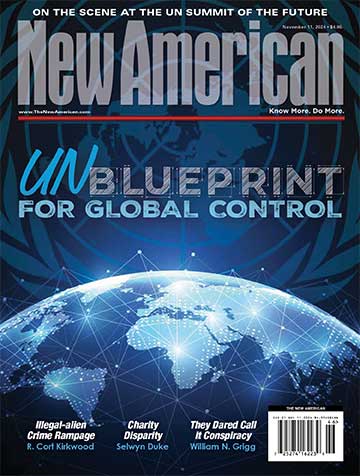
Will the Russia-Ukraine struggle escalate and lead to a third world war? Most national leaders say it won’t. But other nations, including the United States, continue supplying weaponry to Ukraine. While most watchers of world affairs express worries about such aid from a supposed noncombatant, President Joe Biden and most U.S. civilian leaders have repeatedly stated that the U.S. favoritism to Ukraine will not lead to a world conflagration.
But on January 27, 2023, four-star General Mike Minihan, the leader of our nation’s Air Mobility Command, sent a memo to the forces under his leadership that began with his wish — “I hope I am wrong.” The general continued, “My gut tells me we will fight in 2025. Chinese President Xi Jinping secured his third term and established his war council in October 2022. China’s anticommunist breakaway province in Taiwan will hold its own presidential election in 2024. Such an independent act will offer Xi a reason [to begin a fight]. United States presidential elections are in 2024 and will offer a distracted America. Xi’s team, reason and opportunity are all aligned for 2025.”
In short, Gen. Minihan believes a war between the U.S. and China is inevitable, not begun by Russia and not because of the U.S. aid given to Ukraine, but due to Chinese demands that the U.S. cease its alliance with Taiwan, the island home of 21 million that sits very close to the Chinese mainland.
If Minihan’s look-ahead is correct, a Chinese-Russian alliance will face off against the U.S and the growing number of European countries who have become part of the North Atlantic Treaty Organization (NATO), though nuclear weaponry possessed by both sides would not necessarily be employed. China has claimed outright ownership of Taiwan for centuries. And the U.S. has since 1949 expressed its determination to treat the island nation as an allied self-governing enclave, the only portion of China not ruled by the Chinese Communist party.
Threats issued by Beijing about retaking control of Taiwan have become fairly common even in the face of consistent promises by U.S. leaders to defend the island. And the U.S. sending financial and military aid to the breakaway island — and to Ukraine to oppose China’s communist-led Russian ally — do spur predictions that other nations will be drawn into the fray.
Minihan didn’t mention the amount of U.S. financial aid already given to Ukraine or Washington’s promises of armored vehicles, air defense systems, and other weaponry flowing from America to the Zelensky-led Ukrainian government. He focused mainly on his expectation that the action in Ukraine will lead to a battle between the world’s two nuclear powers, Russia and the United States. But he avoided factoring in a very important reality that few ever mention: the control over America’s military arm held by NATO.
Most Americans, possibly even high-ranking U.S. generals and admirals, seem to have little appreciation of how NATO has for decades held final say over how the U.S. military is employed. In 1950, it was NATO that President Harry Truman alluded to as the supplier of authority for our forces to oppose the North Korean attack on its southern neighbor. During that three-year struggle (1950-1953) — and even after the fighting ceased — U.S. military leaders complained about the communist enemy from the north knowing their plans in advance. The still-existing stalemate in Korea has had tens of thousands of American fighters stationed there ever since the shooting stopped in 1953.
A few years after the Korean armistice began, President Lyndon Johnson proudly admitted that a newly created copy of NATO known as SEATO was in charge of U.S. action in Vietnam. After close to a decade of fierce combat costing many casualties on both sides, U.S. forces quit fighting and departed. Their order to do so had to come from SEATO. Add to these engagements the 20 years of struggle in Afghanistan, with NATO ultimately admitting its leadership role over the American forces. The U.S. forces abruptly pulled out and turned that war-torn nation over to the Taliban. Chalk up another victory for the UN won by its NATO stepchild.
The NATO alliance began in 1949 when 12 countries — the U.S., Canada, and ten western European nations — joined the pact amid fears that the USSR would continue its already successful aggression by adding Western European countries to those it was already dominating in Eastern Europe. The NATO Charter agreed to by each member-nation requires military action by all if any NATO participant is attacked. NATO’s founding documents show that the alliance has always been a UN subsidiary. And the UN Charter’s Chapter VIII grants member-nations permission to form “Regional Arrangements,” such as NATO, to conduct military operations as long as their actions are approved, even before being undertaken, by the UN itself.
Since first joining the UN as one of its founding members in 1945, and following that seriously grave step with the formation of NATO and then SEATO, the U.S. has not been the leader of its own military forces and has not won any contests it was permitted to wage. Along the way, the U.S. Constitution’s clearly stated requirement of the need for a formal declaration of war before U.S. forces are sent into action has been ignored. General Minihan seems not to understand the behind-the-scenes roles being played by the UN and its NATO subsidiary.
Yes, an armed struggle might break out with China and Russia on one side and the United States and NATO on the other. If that happens, we can be sure that the real winner will be a strengthened United Nations that will have taken another significant step toward creation of a dominant New World Order, the goal sought by the world body since its 1945 founding.
What should America do? Clearly, withdrawing from the UN and its NATO stepchild is called for. Doing so would restore U.S. officials as the decision-makers regarding possible war and numerous other areas where control has been transferred to the world body. And if China and its Russian ally decide to attack our nation, they would face a determined response where victory, not drawn-out control of operations by others, is the goal.




